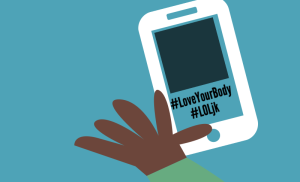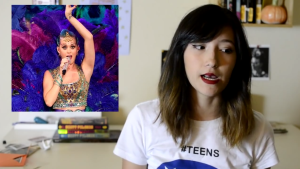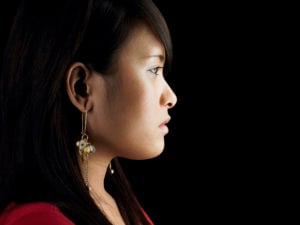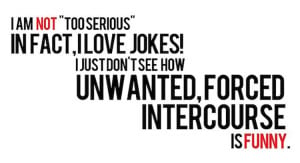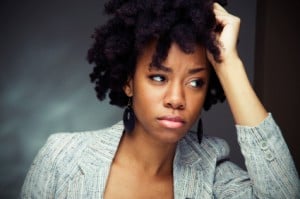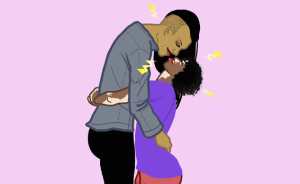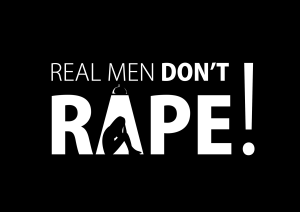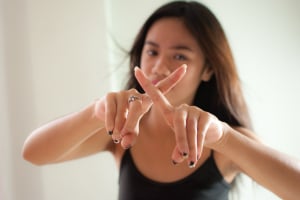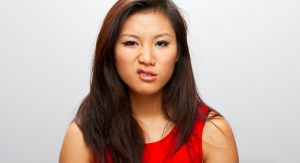When it comes to feeling comfortable with our own bodies, there are generally two perspectives: one centers on personal goals and ideals, and the other on socially constructed wellness standards that supposedly apply to most people.
The former is about an individual desire, like six-pack abs or running a four-minute mile. The latter is about what we understand as general health, like good hygiene and regular bowel movements, however we define those.
Most of us recognize the difference when the examples are simple, like the ones I just gave. But the difference becomes more convoluted when it comes to ideas of what constitutes beauty in women – because we tend to blend the two.
We teach that the illusion of “fitness” (the former) and the experience of “wellness” (the latter) go hand-in-hand, even though they don’t.
This blending is especially prevalent in social media spaces, mainly because the people who push particular beauty standards (supposedly in the name of “health”) want to influence any given woman to feel like whatever they sell (monetarily or ideologically) solves her “problem” of being too fat, eating too many bad foods, getting too old, having unmanageable hair, or not being fit (or sexy) enough.
That is, a lot of the messages we take in that are disguised as social sharing about wellness and self-care are actually more about product sales and the pursuit of skewed beauty standards.
When we encounter messages that basically say “Do what I’m doing, so you can look how I look,” we replace authentic health and wellness (which varies person to person) with propping up one particular wellness profile as the right one – and thereby viewing everyone and everything else as “not enough” or decidedly wrong, limiting our perspective on what health can look like.
And these feelings of righteousness – which are really rooted in a special kind of fear driven by capitalistic diet culture – are symptoms of a dogma that says that every woman should be showing the world, through her Facebook and Instagram accounts, that she is either sexy, fit, or trying to get there – and that maybe for you and me, if we buy the right products and use the most inspiring hashtags, our bodies might just get prettier, look younger, lose the right amount of weight, and have better lives, too.
Supposedly.
And these messages don’t just affect grown women either.
They also influence the five-year-old girl who is expressing a desire for a thinner body and already engaged in some sort of dieting behavior. And the teenage girl who is still growing into her newly puberty-influenced body and shares that social media hurts her body confidence.
Unhealthy effects of these messages include developing a preoccupation with physical appearance, and becoming subject to the court of public opinion on whether her features are beautiful or whether she needs to be “fixing” or hiding something about herself.
Further, this affects the adult woman who feels underrepresented or even ridiculed because of her visible signs of aging, or her kinky hair, or the folds around her core that everyone else seems to be working so hard to hide with the right look, the deepest yoga practice, or the most impressive before-and-after photos of the more acceptable (and therefore more beautiful) version of her.
And while this is harmful – and can’t we all understand just how harmful this shit is? – it’s also something that many of us buy into without realizing it, every time that we post about how much weight we’ve recently lost or Instagram a gym selfie.
This dreadful cycle of making women feel “not good enough” doesn’t only have the diet and advertising industries to blame – but also ourselves.
Thankfully, our social media interactions aren’t irreversibly engineered to fuel body hate and push “fitness culture” (a focus on physical fitness as the same thing as being beautiful or happy) over general wellness.
Many women have learned to utilize empowering hashtags, love-fueled feeds, and powerful blog posts to help them stay aligned with self-love, rather than pursuing what we think looks like self-love through a regimen a self-hate.
My friend Ivy is one of them.
She recently posted a Periscope session based on her blog post about five things she does to make social media a more body-positive experience for her. She touched on a lot of really simple ways to reclaim personal wellness in what can sometimes feel like a hostile, fitness-culture-dominated space.
Messages like Ivy’s are important because they offer solutions to the body-judging messages that often trigger emotions that lead to harmful beliefs about our bodies.
So, as we seek to protect ourselves from these messages (and please, protect yourself from these messages), and to stop unknowingly perpetuating those messages ourselves (and please, stop perpetuating these messages), let’s look at three messages that we so desperately crave to help us counter the constant state of “needs improvement” messages we face when we socialize online.
And then let’s go a bit further by pointing out the skewed messages – the social media shrapnel, if you will – that morph from those messages, so we can examine a) why we sometimes feel bad or bad about ourselves after engaging online and b) what actions (including better hashtags to follow!) we can take toward ditching the focus on obsessive fit culture and overall wellness dogma.
1. ‘Stretch Marks Are Okay’
The Hidden Skew: “But only if you got a baby out of the experience!”
So much of the dialogue around stretch marks ties its acceptability to having earned pregnancy “battle scars” – and that these scars can be minimized or avoided if you use the right concoction of cocoa butter and petroleum jelly.
Or that you can compensate for them with the right look.
Or that your baby is your perfectly acceptable excuse for forcing the world to see (the apparently horrific) evidence of stretched skin.
But what does this say to all the people who don’t have babies, but have stretch marks? Is it less acceptable or more shameful because there’s no baby prize?
I have stretch marks, and I’ve had that conversation with myself a million times before I started to recognize the option of simply being okay with my body.
That led me to explore, and eventually embrace, the truth that my body shifted, for whatever reasons, and I don’t need people (not even my own daughters’ presence) to justify, come to terms with, or validate any aspect of my body.
The truth of the matter is that we can get stretch marks during any time that any parts of our bodies are growing – which explains why so many of us find them on our breasts and hips after puberty.
We can get them with weight loss or weight gain – at any age – and on any part of our bodies.
And they really are okay – with or without a baby.
The Solution: #LoveYourLines
This is one of my favorites accounts and hashtags because their Instagram feed created space for women to speak about their own journeys away from the body guilt and shame related specifically to having stretch marks.
The personal stories prove to us and remind us that stretch marks are normal for any woman.
This hashtag reminds some of us, and perhaps teaches others, that stretch marks are normal and okay, and that “okay” isn’t reserved for women who carried babies in their bellies.
2. ‘It’s Okay to Be Makeup Free and Not ‘Dressed to Impress”
The Hidden Skew: “And when you are those things, you don’t give a fuck!”
I often see #IDGAF (“I don’t give a fuck”) as captions for posts where women are outside their homes sans makeup. When I see those, I cringe as I wonder when walking out of the house with a makeup-free face became synonymous with badassness, or worse yet, reckless abandon.
The dogma here is that a “well put together” woman is always wearing the right makeup and the hot, but not too trendy #OOTD (outfit of the day). And in doing so, she (apparently) proves that she gives a fuck about herself.
Really?
I give several fucks about myself, but this is just how my face looks, and I’m good with that. You get to be good with your face, makeup or no makeup, too.
Granted, sometimes #IDGAF is meant to represent not caring about people’s opinions about women and makeup, but not always.
And that hidden “not always” matters because it misguides girls and women toward the idea that presenting themselves for public approval is akin to washing our faces and brushing our teeth before we leave the house.
This is yet another example of the harmful ways in which we blend personal goals (for example, making time to put on makeup before heading out) and socially constructed wellness standards (like the idea that a mentally well woman – one who gives a fuck – always has the desire and the time to cover her blemishes and add color to her face with makeup).
And that’s not true.
Because it’s possible for women to go out with a fully made-up face, dressed impeccably, and still not be concerned about people’s opinions about our “look” at all.
Because makeup isn’t an example of personal hygiene – as it’s often sold to us – but rather, a personal choice.
Because the use or absence of makeup on a woman’s face isn’t always tied to her self-esteem.
And we need to get used to the idea that, regardless of her choice to wear or abstain from wearing makeup, some women “give a fuck” and some don’t.
The Solution: #NoMakeup (A Reclaimed Version)
We can go to the grocery store in sweatpants, our afros unevenly picked, or our hair pulled into lopsided ponytails, not a dot of makeup on our faces, and still be clean, in a good mood, and very much in a caring space about ourselves.
And when we share using #nomakeup, we not only get to show women with makeup-free faces, we also get the chance to show the ones who are completely comfortable with their natural faces.
3. ‘All Bodies Are Good Bodies’
The Hidden Skew: “But if your body is curvy, you must slay when it comes to style!”
Remember my friend Ivy from the dope post I mentioned earlier?
She is constantly blogging and live streaming about making peace with our bodies and celebrating them just as they are. Her advocacy for body love and wellness reclamation is rooted in her personal journey with body hate, weight management, PCOS, and insulin resistance.
And she is one of the women who feel underrepresented when it comes to her body type.
She went even deeper by explaining how many plus-sized women feel pressure to present their fuller bodies as these well dressed, pin-up-like bodies topped with perfectly laid hair and makeup on fleek.
Clearly, that idea doesn’t resonate with all plus-sized women, yet those that fit this mold get shared, liked, and promoted as more acceptable than a casually dressed fat woman with no goals of becoming a personal stylist.
And that’s unfair.
Because honoring your curves isn’t just about dressing them up.
And simple, comfortable clothes aren’t just reserved for thin people.
And it’s possible (and perfectly okay) to celebrate plus-sized style and plus-sized bodies simultaneously.
The Solution: #HonorMyCurves (The Inclusive, Body-Love Version)
During a recent talk where Ivy and I explored some of these messages that either deny or urge us to change some organic part of our physical existence, the topic of skewed messages in the body love space came up.
Here’s what she said:
“Most of the plus-sized, body-love centered women who are popular online are really fashion/style bloggers who focus on being able to style their big bodies.
I’m sensitive to that, and I understand it, but my issue is that no one celebrates a fat woman in sweatpants and a tank top because that’s not sexy enough. It’s like we switched from shaming women for being fat to shaming them for being fat and plain.
I don’t want to feel that I have to be a sexy, plus-sized pinup version of myself to post a picture online. I rock jeans and Chucks, my hair does its own wild and beautiful thing, and I’m about celebrating my body, even if there are things about it that I want to change. That’s one way to #honormycurves.
It’s more about each person’s ‘why’ and less about how they look or whether their style game is popular online.”
Say that, Ivy!
Her message is about nurturing a sense of value for our bodies based on self-love and appreciation, and not whether other people approve of our particular look on any given day
***
As human beings, we are naturally social creatures.
For some of us, “social” means hanging out with other people, or just one other person, doing good things together. For others, it might just mean observing people from a distance, and engaging through the stories we form from what we observe.
This is why social media, specifically the way we use hashtags, isn’t going away anytime soon: The mediums feed so many facets of the need to be social.
Most people want to feel like part of something, either by being in it, or by observing it, and sometimes the things we see even inspire us to feel better about our choices and ourselves – but not always.
And that contrary set of emotions can leave us feeling underrepresented or outright shamed – and that can be damaging.
Ivy is part of a greater wellness movement that is less focused on changing bodies, and more focused on celebrating them in every shape, size, and form.
There are several hashtags for that, a few of my favorites being #HAES (Health at Every Size) and #effyourbeautystandards.
Like Ivy, so many of us are learning how to love ourselves and to value our bodies just as they are, while compassionately and consistently doing things that benefit our mental, spiritual, emotional, and physical health.
These solutions give us tools for recognizing and replacing wellness dogma and skewed beauty standards with our own thought-out reasons for doing whatever we do to feel good about ourselves.
And this is one route to showing up as our real selves online, not feeling pressured by public opinion, and being totally okay with other people doing what works best for them.
[do_widget id=’text-101′]
Akilah S. Richards is a Contributing Writer for Everyday Feminism. She is a six-time author, digital content writer, and lifestyle coach who writes passionately about self-expression, womanhood, modern feminism, location independence and the unschooling lifestyle. Connect with Akilah on Instagram, Tumblr, or her #radicalselfie e-home, radicalselfie.com. Read her articles.
Search our 3000+ articles!
Read our articles about:
Our online racial justice training
Used by hundreds of universities, non-profits, and businesses.
Click to learn more


